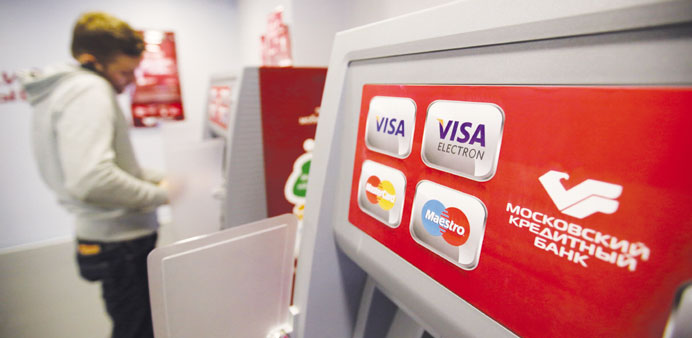Logos for Visa, Maestro and Mastercard payment systems are seen on an automated teller machine inside a bank branch in Moscow. Visa and MasterCard have about six weeks to decide whether a new Russian law requiring them to pay hundreds of millions of dollars to operate in that country is worth the cost.
Visa and MasterCard have about six weeks to decide whether a new Russian law requiring them to pay hundreds of millions of dollars to operate in that country is worth the cost. For now, Visa’s answer is nyet.
Russia’s current demands “just go beyond what we’d be willing to do,” Visa Chief Executive Officer Charlie Scharf said at an investor conference in Boston. “I would hope that we get to a different conclusion than to get to July 1 and just say we’re not willing to participate.”
Scharf and MasterCard CEO Ajay Banga said they’re talking with Russian lawmakers about making changes to the legislation, passed in response to sanctions the US imposed to protest the Russian role in Ukraine’s turmoil. At stake is about $638mn in combined annual revenue for the two payments networks as well their foothold in a market that’s shifting from cash to electronic forms of payment. US threats of even more sanctions loom over the discussions.
“They’ve got three options - do we stay, can we leave or can we negotiate?” William Pomeranz, deputy director of the Kennan Institute for Advanced Russian Studies at the Woodrow Wilson International Center for Scholars in Washington DC, said in a phone interview. “If additional sanctions are introduced after the Ukraine elections, then it’s less likely that the Russian government will back down.”
Ukraine is due to hold presidential elections on May 25.
Dmitry Medvedev, Russia’s prime minister, urged the two companies to fulfil their responsibilities to clients and stay in Russia.
“What Visa and MasterCard did was a direct violation of their contract with Russian clients, not banks, but individuals who trusted these payment systems,” Medvedev said in a Bloomberg TV interview in Moscow.
After Visa and MasterCard stopped processing payments at four Russian banks in response to US sanctions, Russia passed a law creating its own national payment system and imposing rules for foreign firms that include fines for denying services and a mandatory security deposit starting in July.
Shares of both companies tumbled after Visa said last month that the Russian prohibitions may trim “several pennies” from 2014 earnings and MasterCard said it expects a “small impact” on this year’s results.
The new law requires that firms make deposits at the Russian Central Bank that will be tapped should they block transactions. Purchase, New York-based MasterCard and Visa said yesterday that the collateral would amount to “hundreds of millions” of dollars.
MasterCard generated about 2% of its revenue from Russia, or about $167mn last year, mostly from domestic customers, the firm has said. The country represents “a couple of points” of revenue for Foster City, California-based Visa, with most of that from cross-border transactions, Scharf, 49, said. That amounts to about 3% to 4% of Visa’s annual revenue, or as much as $471mn last year, according to estimates from Morgan Stanley.
“We’ve had meetings with the Central Bank, meetings with the Ministry of Finance and are waiting for that clarity,” MasterCard’s Banga, 54, said at the investor conference. He didn’t elaborate on whether MasterCard was willing to meet Russia’s current demands.
The new rules could compromise the networks’ prospects in Russia as well as in other emerging markets such as China, the world’s second-largest economy, analysts including Morgan Stanley’s Smittipon Srethapramote said.
“It’s not just the fees that they have to pay, it’s that it potentially sets a precedent,” Srethapramote said.MasterCard has slid 12% this year to close at $73.86 in New York, while Visa has declined 5.5% to $210.36.
If Russia or its proxies disrupt the presidential vote, the US and its allies “will impose sectoral economic sanctions,” Secretary of State John Kerry said May 15. The US has warned that Russia’s military, energy and financial industries may become targets.
“This would essentially force Visa and MasterCard to withdraw,” Anders Aslund, a senior fellow at the Peterson Institute for International Economics in Washington, said in a phone interview. “The cost would be substantial.”
Should the two companies completely withdraw, the biggest effect would be on the 15% of Russia’s population who regularly travel abroad, Aslund said.
The firms’ decisions will be closely watched by all US companies that do business in Russia, Pomeranz said.
“What happens to them will be a signal of what’s ahead,” Pomeranz said. “If Visa and MasterCard can’t work there, who is going to be able to work in Russia?”

